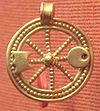Nabia

Nabia (or Navia) was a goddess of the Pre-Roman peoples of the Iberian Peninsula, although she also had an extended cult during the Roman occupation of the peninsula.[2]
Nabia was worshipped in many places on the Iberian Peninsula, sometimes in very different ways, leading some historians to suggest that "Nabia" was just a common word used by different peoples to refer to their deities (a theory questioned by others).[3][page needed] Due to the uncertainty of her nature, she is sometimes interpreted as a water deity,[1] other times she is associated with valleys, forests and hills,[4] and she's further seen as the goddess of fertility, health, and abundance.[5]
References
- ^ a b FERREIRA, Daniela. Os Deuses foram honrados, 2022.
- ^ Estudios sobre la tabula siarensis, Anejos de Archivo Español de Arqueología IX, Madrid, 1988, p. 264.
- ^ MELENA, José L. Un ara votiva romana en el Gaitán, Cáceres, 1984.
- ^ Los Dioses de la Hispania Céltica, Madrid, 2002.[page needed]
- ^ "Um balneário com 3 mil anos". Público. 2007-02-28.
Further reading
- Olivares Pedreño, Juan Carlos. "El culto a Nabia en Hispania y las diosas polifuncionales indoeuropeas". In: Lucentum, ISSN-e 1989-9904, Nº 17-18, 1998-1999, págs. 229-242. ISSN 0213-2338.
- Prósper, Blanca María. "El nombre de la diosa lusitana Nabia y el problema del betacismo en las lenguas del occidente peninsular". In: Ilu 2 (1997): 141-149.

